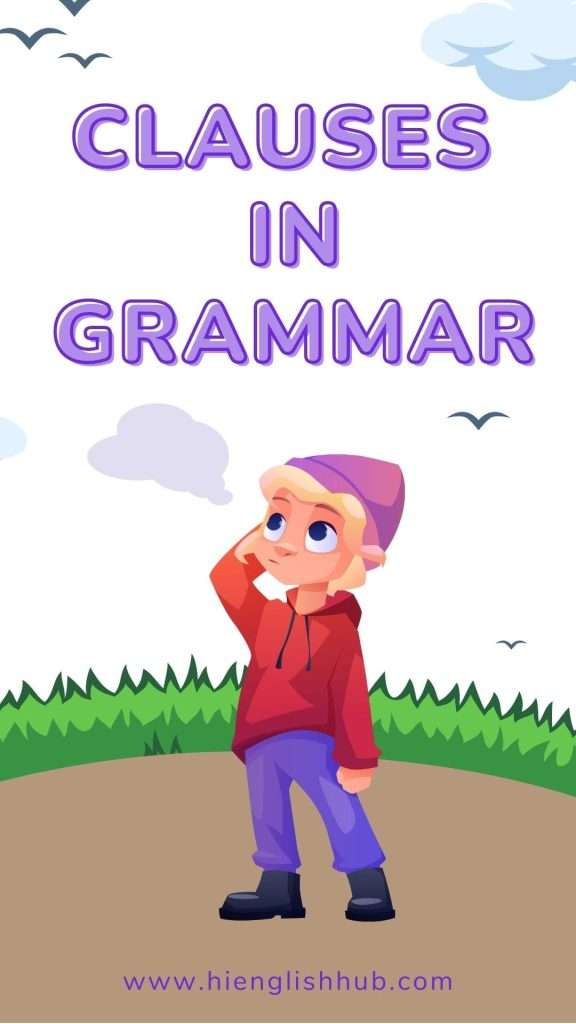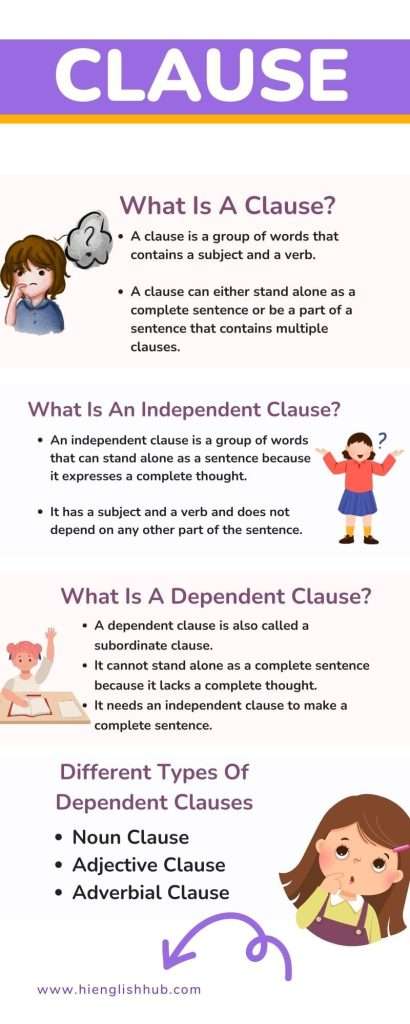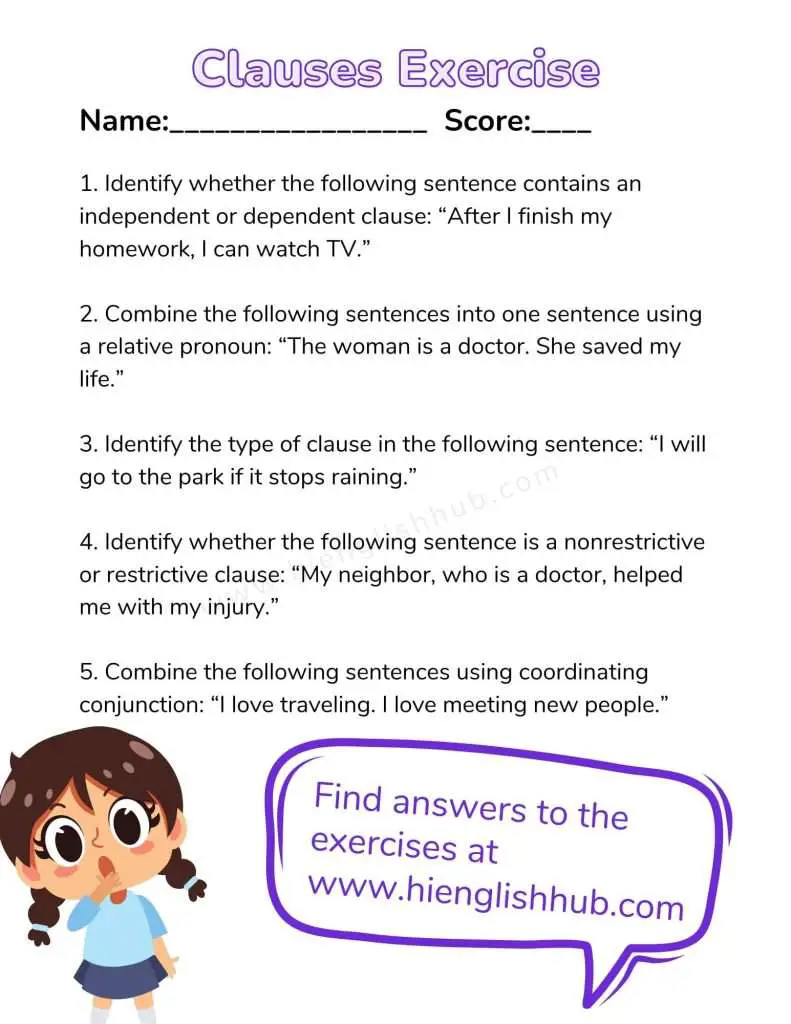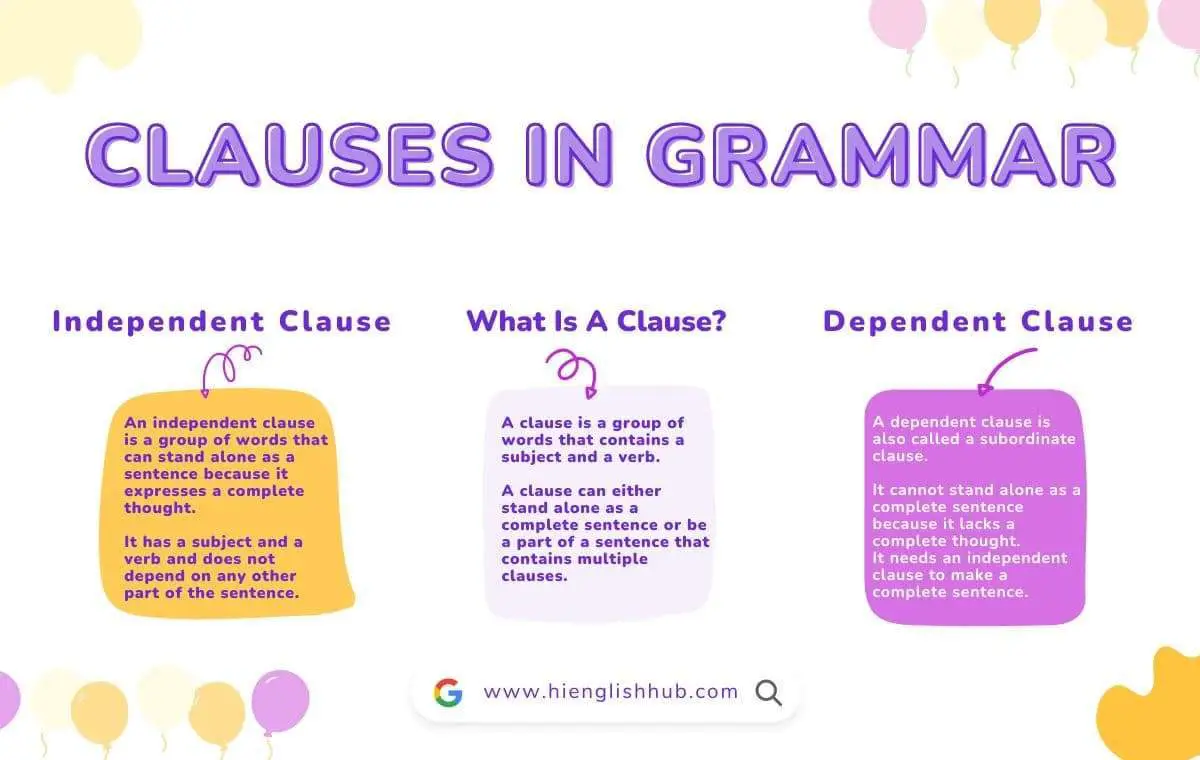Learning grammar can be challenging, especially for learners of English as a Second Language.
One of the essential components of English grammar is clauses.
In this blog post, we will define what a clause is and explore its different types with examples.
We will also discuss common mistakes to avoid and provide practice exercises to help you master the art of using clauses.
So, get ready to embark on a fun and exciting journey through the world of clauses!

What Is A Clause?
A clause is a group of words that contains a subject and a verb.
A clause can either stand alone as a complete sentence or be a part of a sentence that contains multiple clauses.
They’re a crucial part of English grammar, and understanding how to use them correctly can greatly improve your writing and speaking skills.

Clause Vs. Phrase
| Clause | Phrase |
|---|---|
| A group of words that contains a subject and a verb | A group of words that lacks a subject or a verb or both |
| Can stand alone as a sentence or | Cannot stand alone as a sentence |
| be part of a larger sentence | Acts as a part of a sentence |
| Example: She loves to read. | Example: Under the table |
| Clauses can be divided into two categories: independent and dependent. | Phrases are divided into several categories such as noun, verb, prepositional, and adjective phrases. |
Clause Vs. Sentence
| Clause | Sentence | |
|---|---|---|
| Definition | A group of words that contains a subject and a verb, and can express a complete thought or be part of a larger sentence | A group of words that contains a subject and a verb, and expresses a complete thought on its own |
| Example | Although she was tired (dependent clause), she continued working on the project (independent clause). | She was tired from working on the project (independent clause). |
| Standalone | Can be part of a larger sentence or stand alone as a sentence | Always stands alone as a complete sentence |
| Punctuation | Can be separated by commas or other punctuation marks in a larger sentence | Must end with a period, exclamation point, or question mark |
| Purpose | Provides additional information within a sentence (dependent clause) | Conveys a complete thought and stands alone as a statement, question, or exclamation |
Types Of Clauses With Examples
There are two types of clauses: independent clauses and dependent clauses.
What Is An Independent Clause?
An independent clause is a group of words that can stand alone as a sentence because it expresses a complete thought.
It has a subject and a verb and does not depend on any other part of the sentence.
Independent clause examples
– She plays the piano beautifully.
In this sentence, “She plays the piano beautifully” is the independent clause.
It can stand alone as a complete sentence because it expresses a complete thought and contains a subject (she) and a verb (plays).
– John went to the store (independent clause), but he forgot his wallet (independent clause).
Both independent clauses, “John went to the store” and “he forgot his wallet,” can stand alone as complete sentences.
However, when they are combined with the coordinating conjunction “but,” they form a compound sentence.
It’s important to note that independent clauses can be shorter or longer than these examples, but they must always contain a subject and a verb and express a complete thought.
Review:
What Is A Dependent Clause?
A dependent clause is also called a subordinate clause.
It cannot stand alone as a complete sentence because it lacks a complete thought.
It needs an independent clause to make a complete sentence.
Dependent clauses are usually introduced by subordinating conjunctions such as “because,” “if,” or “when.”
Here’s an example: When I am hungry (dependent clause), I like to eat pizza (independent clause).
The dependent clause “when I am hungry” cannot stand alone as a sentence because it is incomplete. It needs the independent clause “I like to eat pizza” to make a complete sentence.
Different types of dependent clauses
Noun Clause
A noun clause is a dependent clause that serves as a noun in a sentence.
It can be the subject, object, or complement of a sentence. It usually begins with words like “what,” “where,” “who,” “that,” “if,” “when,” “why,” and “how.”
For example, in the sentence “I don’t know what time it is,” the phrase “what time it is” is a noun clause that serves as the direct object of the verb “know.”
It acts like a noun because it is the thing that the subject “I” doesn’t know.
Other examples of noun clauses include:
- She said that she would come to the party. (The noun clause “that she would come to the party” is the direct object of the verb “said.”)
- Whoever wins the game gets a trophy. (The noun clause “whoever wins the game” is the subject of the verb “gets.”)
Also read:
Adjective Clause
An adjective clause is also known as a relative clause.
It functions as an adjective and modifies a noun or pronoun in the sentence.
The clause usually starts with a relative pronoun such as “who,” “whom,” “whose,” “that,” or “which.”
Adjective clause examples
The woman who lives next door is a doctor. (In this sentence, “who lives next door” is the adjective clause that modifies “woman.”)
The dog, which is brown and white, is running in the park. (The adjective clause “which is brown and white” describes the noun “dog.”)
The teacher, who has a Ph.D. in English, is very knowledgeable. (The adjective clause “who has a Ph.D. in English” describes the noun “teacher.”)
Adverbial Clause
An adverbial clause is a type of dependent clause that functions as an adverb in a sentence.
This means it modifies or describes a verb, adjective, or another adverb in the sentence, telling us how, when, where, why, or under what conditions something happened.
Adverbial clauses usually begin with a subordinating conjunction such as “because,” “if,” “since,” “although,” or “when.”
For example: “He couldn’t sleep because the room was too noisy.” In this sentence, “because the room was too noisy” is the adverbial clause that explains why he couldn’t sleep.
Another example is the sentence: “After I finish my homework, I will watch TV.” The clause “After I finish my homework” is an adverbial clause because it modifies the verb “will watch.” It tells us when the action of watching TV will occur—after finishing homework.
10 Examples Of Clauses
1. Conditional clause/if-clause: I will study harder if I want to get good grades.
Also read: Zero Conditional Sentences
2. Adverbial clause: Although I was nervous, I did well on my IELTS test.
3. Noun clause: What you said earlier made me upset.
4. Relative clause: The dog, which was black and white, barked at the mailman.
5. Independent clause: I love to read books.
6. Adverbial clause: If you want to succeed in school, you must develop good study habits like taking notes and reviewing your material regularly.
7. Adjective clause: She is a person who always helps others.
8. Noun clause: I wonder if she will come to the party.
9. Nonrestrictive clause: She didn’t like the movie, which surprised me.
10. Adverbial clause: After I finish my degree, I plan to take a gap year and travel the world.
Common Mistakes To Avoid When Using Clauses
If you’re looking to improve your writing skills, it’s important to avoid some common mistakes when using clauses.
| Common Mistake | Description | Example of Incorrect Usage | Corrected Version |
|---|---|---|---|
| Run-on Sentences | A sentence with multiple independent clauses without proper punctuation or conjunctions | I love to travel I want to go to Europe next summer. | I love to travel, and I want to go to Europe next summer. |
| Sentence Fragments | A group of words that is not a complete sentence because it’s missing either a subject or a verb, or both | Running in the park on a sunny day. | I love running in the park on a sunny day. |
| Misusing Dependent Clauses | A group of words that cannot stand alone as a sentence because it’s incomplete | Because I love pizza. | Because I love pizza, I order it every Friday night. |
| Misusing Relative Clauses | A clause that starts with a relative pronoun and gives more information about a noun or pronoun in the sentence | The girl that is wearing a blue shirt is my friend. | The girl who is wearing a blue shirt is my friend. |
| Using Too Many Clauses | Using too many clauses can make a sentence difficult to read and understand | Although I wanted to go to the beach, my friend said she preferred to stay home and watch a movie, but then she changed her mind and suggested we go out to dinner instead, and I agreed because I was hungry. | I wanted to go to the beach, but my friend suggested we go out to dinner instead, and I agreed because I was hungry. |
Exercises For Using Clauses Correctly

1. Identify whether the following sentence contains an independent or dependent clause: “After I finish my homework, I can watch TV.”
2. Combine the following sentences into one sentence using a relative pronoun: “The woman is a doctor. She saved my life.”
3. Identify the type of clause in the following sentence: “I will go to the park if it stops raining.”
4. Identify whether the following sentence is a nonrestrictive or restrictive clause: “My neighbor, who is a doctor, helped me with my injury.”
5. Combine the following sentences using coordinating conjunction: “I love traveling. I love meeting new people.”
1. Dependent clause: “After I finish my homework.” Independent clause: “I can watch TV.”
2. The woman who saved my life is a doctor.
3. Adverbial clause, indicating the condition under which the subject will go to the park.
4. Nonrestrictive clause, providing additional information about the neighbor, which is not necessary to the meaning of the sentence.
5. I love traveling, and I love meeting new people.
FAQ On Clause
What Is A Clause In A Sentence?
A clause is a group of words that contains a subject and a verb. It can either stand alone as a complete sentence or be a part of a sentence that contains multiple clauses.
What Is A Subordinate Clause?
A subordinate clause is also called a dependent clause. It cannot stand alone as a complete sentence because it lacks a complete thought. It always needs an independent clause to make a complete sentence.
Which Sentence Contains A Restrictive Clause?
A restrictive clause is a type of relative clause that defines the noun it modifies. The following sentence contains a restrictive clause: The man who stole my wallet was arrested. (The relative clause “who stole my wallet” modifies the noun “man.”)
Mastering The Art Of Clauses
Alright, it looks like we’ve covered a lot about clauses today!
Remember, a clause is just a group of words that has a subject and a verb. Dependent clauses rely on other parts of the sentence, while independent clauses can stand alone as their own sentence.
If you found this helpful, please share it with your friends, and make sure to follow Hi English Hub on Pinterest and Twitter for more language tips and tricks!
Thanks for joining me today, and happy learning!


